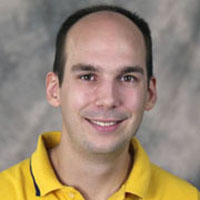
professor in Florida State's
psychology department.
A faculty member in Florida State University’s College of Arts and Sciences is the recipient of two major honors relating to his research in the field of cognitive science.
Mike Kaschak, an associate professor in the college’s Department of Psychology, has been elected a fellow of the Association of Psychological Science (APS), the largest international organization for researchers in the field of psychological research. The association’s mission is “to promote, protect and advance the interests of scientifically oriented psychology in research, application teaching, and the improvement of human welfare.”
Kaschak also has received an Outstanding Young Investigator Award from the Psychonomic Society, a major organization devoted to experimental cognitive psychology. Researchers who have made significant contributions to the field and are no more than 10 years into their careers are eligible for the award.
“It’s a great honor for my research contributions to be recognized by the APS and Psychonomic Society, particularly since both recognitions come from other scientists in the field,” Kaschak said. “Of course, part of these honors should go to the graduate and undergraduate students in my lab who have made valuable contributions to my work, and to my psychology colleagues at FSU who make this a stimulating place to do research.”
RELATED AUDIO
In addition to teaching, Kaschak’s work focuses on the study of language, specifically the mechanisms through which we are able to comprehend and produce language. Kaschak seeks to answer two key questions.
“First,” he said, “how does language become meaningful to us? We are addressing these questions by pursuing the hypothesis that linguistic meaning is grounded in our own systems of perception and action planning. That is, we understand sentences about action — for example, ‘Open the door’ — not in terms of the meaning of the individual words in the sentence, but in terms of the motor patterns needed to perform the action, such as pulling your arms toward your body. Similarly, we understand sentences about motion, such as ‘The car approached you,’ by utilizing our visual system to simulate what it would look like if a car actually was approaching.”
How does this play out in the real world? In collaboration with other researchers at the FSU-based Florida Center for Reading Research, he seeks to take these hypotheses about linguistic meaning to develop new techniques to boost reading comprehension in children, particularly at the elementary school level.
As part of the large-scale Reading for Understanding project, Kaschak and his colleagues are testing the hypothesis that asking students to move their hands and arms while reading can improve their comprehension of certain kinds of text. For example, students may be asked to press and rub their hands together while reading about the movement of tectonic plates. The physical experience of moving the hands against each other is expected to improve comprehension by helping to ground the students’ understanding of what is being explained by the text — namely, the way that the movement of plates can lead to the build-up and release of energy.
A second major area of Kaschak’s research involves examining how changes in our linguistic environment — “for example, meeting new speakers of your language or encountering a new dialect of your native language in another part of the world” — affect our subsequent ability to comprehend and produce language.
“I am approaching this question by exploring the nature of the learning and memory mechanisms that support our ability to adapt our language use to changes in the linguistic environment,” he said.
The attention Kaschak’s research has received is well deserved, according to Ellen Berler, associate chair of the psychology department.
“I’m delighted that Dr. Kaschak is being recognized for important contributions to his field,” Berler said. “His accomplishments are impressive and are reflected in his selection as an APS fellow as well as his recent selection for the Psychonomic Society’s Outstanding Young Investigator Award. These major academic organizations give these awards to researchers who have made sustained and significant research contributions to the science of psychology. We look forward to Dr. Kaschak’s continued success.”
Margaret Wright-Cleveland, director of Florida State’s Office of Faculty Recognition, echoed the praise.
“Election to APS fellow recognizes Michael Kaschak as a national leader in psychology and gives his work even greater import than it already has,” Wright-Cleveland said. “This election by his peers is a well-deserved and significant honor.”




